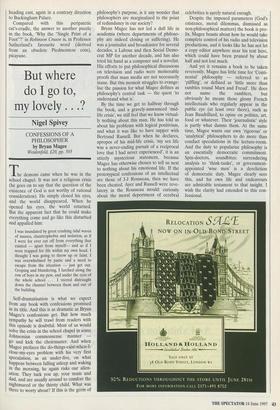But where
do Igo to, my lovely . . .?
Nigel Spivey
CONFESSIONS OF A PHILOSOPHER by Bryan Magee Weidenfeld, £20, pp. 503 The demons came when he was in the school chapel: It was not a religious crisis (he goes on to say that the question of the existence of God is not worthy of rational consideration). He simply closed his eyes, and the world disappeared. When he opened his eyes, the world returned. But the apparent fact that he could make everything come and go like this disturbed and appalled him: I was inundated by great crashing tidal waves of nausea, claustrophobia and isolation, as if I were for ever cut off from everything that existed — apart from myself— and as if I were trapped for life within my own head. I thought I was going to throw up or faint. I was overwhelmed by panic and a need to escape from the situation — just get out. Groping and blundering, I lurched along the row of boys in my pew, and under the eyes of the whole school . .. I veered distraught down the channel between them and out of the building.
Self-dramatisation is what we expect from any book with confessions promised in its title. And this is as dramatic as Bryan Magee's confessions get. But how much sympathy he will trawl from readers with this episode is doubtful. Most of us would solve the crisis in the school chapel in some Johnsonian commonsense manner go and kick the choirmaster. And when Magee prefaces the do-things-exist-when-I- close-my-eyes problem with his very first speculation, as an under-five, on what happens between falling asleep and waking in the morning, he again risks our alien- ation. They tuck you up, your mum and dad, and are usually around to comfort the nightmared or the thirsty child. What was there to worry about? If this is the germ of philosophy's purpose, is it any wonder that philosophers are marginalised to the point of redundancy in our society?
Bryan Magee has not led a dull life in academia (where departments of philoso- phy are indeed closing or suffering). He was a journalist and broadcaster for several decades, a Labour and then Social Demo- crat MP for another decade, and has also tried his hand as a composer and a novelist. His efforts to put philosophical discussions on television and radio were memorable proofs that mass media are not necessarily inane. But this memoir struggles to evange- lise the passion for what Magee defines as philosophy's central task — the quest 'to understand what is'.
By the time we get to halfway through the book, and a gravely-announced `mid- life crisis', we still feel that we know virtual- ly nothing about this man. He has told us about his problems with logical positivism, and what it was like to have supper with Bertrand Russell. But when he declares, apropos of his mid-life crisis, 'my sex life was a never-ending pursuit of a reciprocal love that I had never experienced', it is an utterly mysterious statement, because Magee has otherwise chosen to tell us next to nothing about his emotional life. If the prototypical confessions of an intellectual are those of J-J Rousseau, then we have been cheated. Ayer and Russell were reve- latory in the Rousseau mould: curiosity about the moral deportment of cerebral celebrities is surely natural enough.
Despite the imposed parameters (God's existence, moral dilemmas, dismissed as non-philosophical matters) the book is pro- lix. Magee boasts about how he would take complete control of his radio and television productions, and it looks like he has not let a copy editor anywhere near his text here, which could have been pruned by about half and not lost much.
And yet it remains a book to be taken reverently. Magee has little time for 'Conti- nental' philosophy — referred to as `piffling', or defined as 'little more than rambles round Marx and Freud'. He does not name the ramblers, but obviously he means those glossy French intellectuals who regularly appear in the public eye (at least over there), such as Jean Baudrillard, to opine on politics, art, food or whatever. Their 'journalistic' style is partly what damns them. At the same time, Magee wants our own 'rigorous' or `analytical' philosophers to do more than conduct speculations in the lecture-room. And the duty to popularise philosophy is an essentially democratic commitment. Spin-doctors, soundbites: surrendering analysis to 'think-tanks', or government- appointed 'wise men' is a dereliction of democratic duty. Magee clearly sees this, and his own life and endeavours are admirable testament to that insight. I wish the clarity had extended to this con- fessional.










































































 Previous page
Previous page